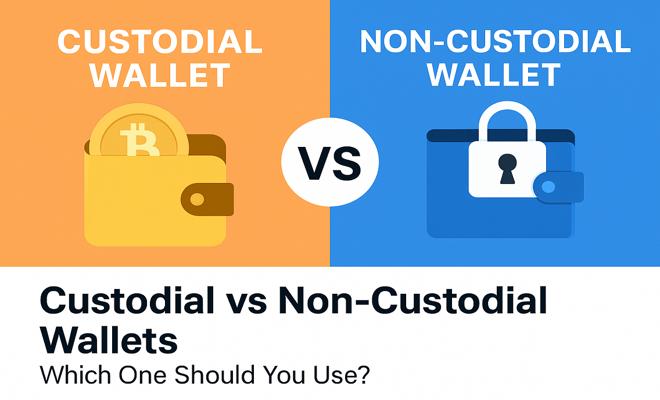
Custodial vs Non-Custodial Wallets: Which One Should You Use?
As cryptocurrency adoption continues to rise across the globe 🌍, more people are getting involved with digital assets like Bitcoin, Ethereum, and beyond. But before you can buy, trade, or invest in crypto, there's one important step you can't skip — choosing the right crypto wallet.
One of the biggest decisions is whether to go with a custodial wallet or a non-custodial wallet. Each has its benefits, risks, and use cases. In this guide, we'll break it all down in simple terms so you can confidently choose the best wallet for your needs. 🧠💡
🔍 What Is a Crypto Wallet?
A crypto wallet is a digital tool that lets you store, send, and receive cryptocurrencies. But unlike a regular wallet that holds cash, a crypto wallet stores your private keys — special codes that give you access to your digital money on the blockchain. 🔑
💼 What Is a Custodial Wallet?
A custodial wallet is managed by a third party — usually a crypto exchange or financial service — that holds your private keys for you. It’s like keeping your money in a bank account: you can access it, but someone else is holding the keys.
✔️ Examples of Custodial Wallets:
- Binance Wallet
- Coinbase (exchange wallet)
- Crypto.com App
- Kraken
✅ Pros of Custodial Wallets:
- 🔐 No need to manage private keys
- 🖥️ Simple and beginner-friendly
- 🚀 Fast transactions within platforms
- 🛠️ Access to customer support
⚠️ Cons of Custodial Wallets:
- ❌ You don’t control your private keys
- 🚫 Risk of hacks or platform failures
- ⛔ Possibility of frozen funds
- 📜 Subject to government regulations
🛡️ What Is a Non-Custodial Wallet?
A non-custodial wallet gives you full control over your private keys and your crypto. You are the only one who can access your funds — and you are 100% responsible for keeping your keys safe.
✔️ Examples of Non-Custodial Wallets:
- MetaMask
- Trust Wallet
- Exodus
- Ledger (hardware wallet)
- Trezor (hardware wallet)
✅ Pros of Non-Custodial Wallets:
- 🔑 You own and control your private keys
- 🚫 No third-party involvement
- 📲 Increased privacy and censorship resistance
- 💡 Best for DeFi, NFTs, and staking
⚠️ Cons of Non-Custodial Wallets:
- 🧠 Requires knowledge of wallet security
- 📉 Lost keys mean lost funds
- ❗ No customer support if you make a mistake
📊 Comparison Table: Custodial vs Non-Custodial Wallets
| Feature | Custodial Wallet | Non-Custodial Wallet |
|---|---|---|
| Control of Private Keys | ❌ Third Party | ✅ You |
| Ease of Use | ✅ Very Easy | ⚠️ Requires Knowledge |
| Security Risk | ⚠️ Depends on Provider | 🔐 Depends on You |
| Access to DeFi/NFTs | ❌ Limited | ✅ Full Access |
| Recovery Options | ✅ Customer Support | ❌ Self-managed |
🧠 When Should You Use a Custodial Wallet?
Custodial wallets are great for:
- 🆕 Beginners starting with crypto
- 📈 Active traders
- 👥 Users who want convenience and support
- 💼 Institutions working with regulated platforms
🔓 When Should You Use a Non-Custodial Wallet?
Non-custodial wallets are better for:
- 🎯 Long-term HODLers
- 🧑💻 Tech-savvy users focused on privacy
- 🌐 Users active in DeFi and Web3
- 🛡️ Anyone who wants full control of their assets
💬 Not Your Keys, Not Your Coins
The famous crypto saying, “Not your keys, not your coins,” reminds us of one key truth: if you don’t control your private keys, your crypto isn’t really yours. Custodial wallets are convenient, but they require trust. Non-custodial wallets offer freedom, but they come with responsibility. 🌍🧠
🔒 Pro Tips for Crypto Wallet Security
- 📋 Always backup your seed phrase and store it offline
- 🔐 Use strong passwords and enable 2FA
- 💾 Consider hardware wallets for large crypto holdings
- 🚫 Never share your private key with anyone
- 📵 Avoid storing keys on phones or emails
📌 Final Thoughts
Choosing between a custodial and non-custodial wallet depends on your experience, comfort level, and goals. Beginners might prefer the simplicity of custodial wallets. More advanced users and those who value control and privacy may go non-custodial.
✅ Many crypto users actually use both! For quick, small trades, they keep a custodial wallet. For long-term storage and security, they rely on a non-custodial (or hardware) wallet. 🔄
🧭 Still exploring your options? Check out more wallet guides and comparisons right here on BitMedia24 — your trusted source for all things crypto!